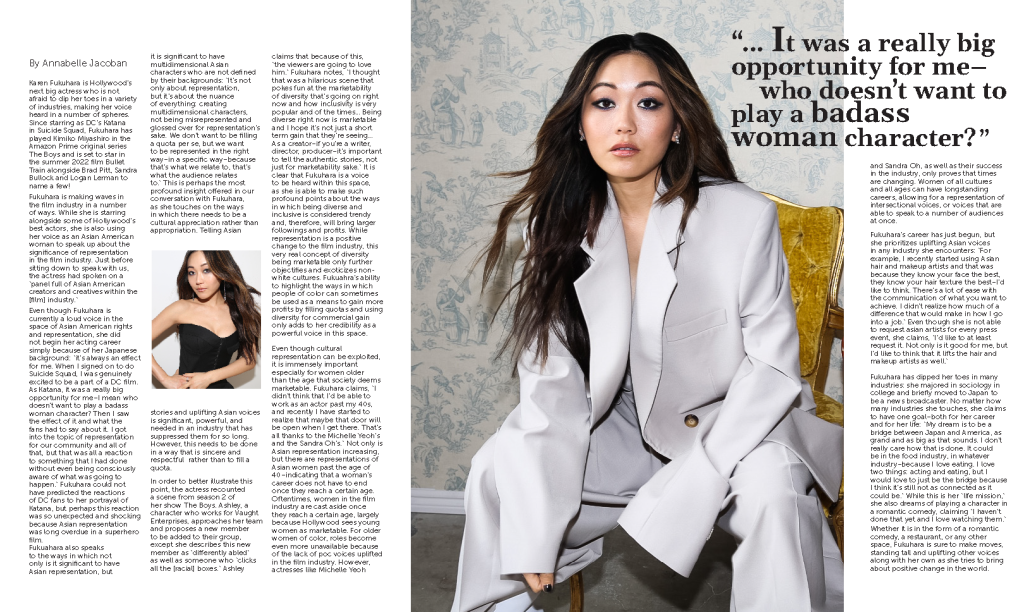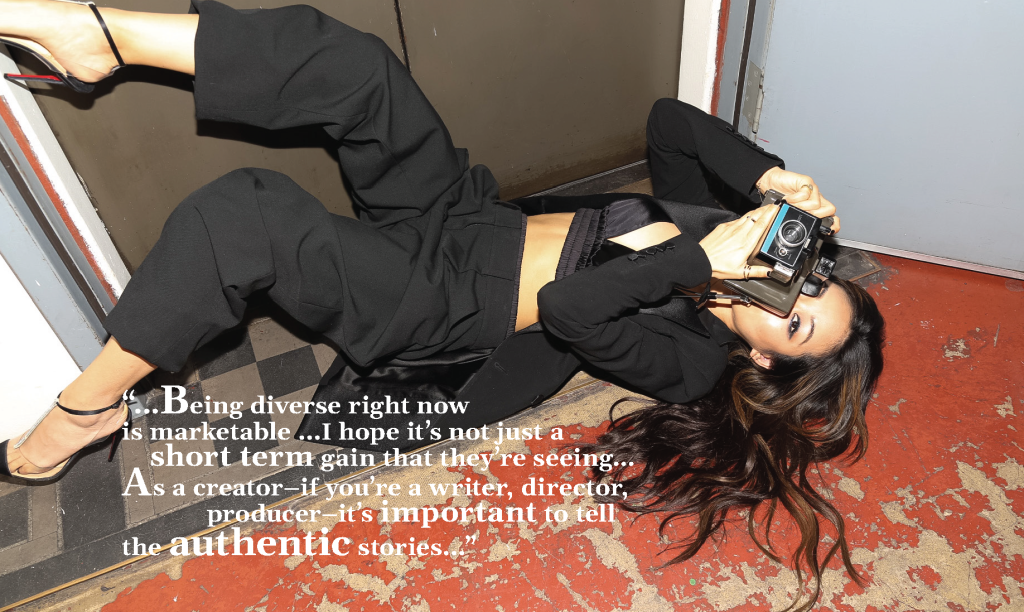
“… IT’S NOT ONLY ABOUT REPRESENTATION, BUT IT’S ABOUT THE NUANCE OF EVERYTHING: CREATING MULTIDIMENSIONAL CHARACTERS, NOT BEING MISREPRESENTED AND GLOSSED OVER FOR REPRESENTATION’S SAKE…”
By Annabelle Jacoban
Karen Fukuhara is Hollywood’s next big actress who is not afraid to dip her toes in a variety of industries, making her voice heard in a number of spheres. Since starring as DC’s Katana in Suicide Squad, Fukuhara has played Kimiko Miyashiro in the Amazon Prime original series The Boys and is set to star in the summer 2022 film Bullet Train alongside Brad Pitt, Sandra Bullock and Logan Lerman to name a few!
Fukuhara is making waves in the film industry in a number of ways. While she is starring alongside some of Hollywood’s best actors, she is also using her voice as an Asian American woman to speak up about the significance of representation in the film industry. Just before sitting down to speak with us, the actress had spoken on a “panel full of Asian American creators and creatives within the [film] industry.”

“…It was a really big opportunity for me–who doesn’t want to play a badass woman character?”
Even though Fukuhara is currently a loud voice in the space of Asian American rights and representation, she did not begin her acting careers imply because of her Japanese background: “it’s always an effect for me. When I signed on to do Suicide Squad, I was genuinely excited to be a part of a DC film. As Katana, it was a really big opportunity for me–I mean who doesn’t want to play a badass woman character? Then I saw the effect of it and what the fans had to say about it. I got into the topic of representation for our community and all of that, but that was all a reaction to something that I had done without even being consciously aware of what was going to happen.” Fukuhara could not have predicted the reactions of DC fans to her portrayal of Katana, but perhaps this reaction was so unexpected and shocking because Asian representation was long overdue in a superhero film.
Fukuahara also speaks to the ways in which not only is it significant to have Asian representation, but it is significant to have multidimensional Asian characters who are not defined by their backgrounds: “It’s not only about representation, but it’s about the nuance of everything: creating multidimensional characters, not being misrepresented and glossed over for representation’s sake. We don’t want to be filling a quota per se, but we want to be represented in the right way–in a specific way–because that’s what we relate to, that’s what the audience relates to.” This is perhaps the most profound insight offered in our conversation with Fukuhara, as she touches on the ways in which there needs to be a cultural appreciation rather than appropriation. Telling Asian stories and uplifting Asian voices is significant, powerful, and needed in an industry that has suppressed them for so long. However, this needs to be done in a way that is sincere and respectful rather than to fill a quota.

In order to better illustrate this point, the actress recounted a scene from season 2 of her show The Boys. Ashley, a character who works for Vaught Enterprises, approaches her team and proposes a new member to be added to their group, except she describes this new member as “differently abled” as well as someone who “clicks all the [racial] boxes.” Ashley claims that because of this, “the viewers are going to love him.” Fukuhara notes, “I thought that was a hilarious scene that pokes fun at the marketability of diversity that’s going on right now and how inclusivity is very popular and of the times… Being diverse right now is marketable and I hope it’s not just a short term gain that they’re seeing… As a creator–if you’re a writer, director, producer–it’s important to tell the authentic stories, not just for marketability sake.” It is clear that Fukuhara is a voice to be heard within this space, as she is able to make such profound points about the ways in which being diverse and inclusive is considered trendy and, therefore, will bring larger followings and profits. While representation is a positive change to the film industry, this very real concept of diversity being marketable only further objectifies and exoticizes non-white cultures. Fukuahra’s ability to highlight the ways in which people of color can sometimes be used as a means to gain more profits by filling quotas and using diversity for commercial gain only adds to her credibility as a powerful voice in this space.
Even though cultural representation can be exploited, it is immensely important especially for women older than the age that society deems marketable. Fukuhara claims, “I didn’t think that I’d be able to work as an actor past my 40s, and recently I have started to realize that maybe that door will be open when I get there. That’s all thanks to the Michelle Yeoh’s and the Sandra Oh’s.” Not only is Asian representation increasing, but there are representations of Asian women past the age of 40–indicating that a woman’s career does not have to end once they reach a certain age. Oftentimes, women in the film industry are cast aside once they reach a certain age, largely because Hollywood sees young women as marketable. For older women of color, roles become even more unavailable because of the lack of poc voices uplifted in the film industry. However, actresses like Michelle Yeoh and Sandra Oh, as well as their success in the industry, only proves that times are changing. Women of all cultures and all ages can have longstanding careers, allowing for a representation of intersectional voices, or voices that are able to speak to a number of audiences at once.
Fukuhara’s career has just begun, but she prioritizes uplifting Asian voices in any industry she encounters: “For example, I recently started using Asian hair and makeup artists and that was because they know your face the best, they know your hair texture the best–I’d like to think. There’s a lot of ease with the communication of what you want to achieve. I didn’t realize how much of a difference that would make in how I go into a job.” Even though she is not able to request asian artists for every press event, she claims, “I’d like to at least request it. Not only is it good for me, but I’d like to think that it lifts the hair and makeup artists as well.”

Fukuhara has dipped her toes in many industries: she majored in sociology in college and briefly moved to Japan to be a news broadcaster. No matter how many industries she touches, she claims to have one goal–both for her career and for her life: “My dream is to be a bridge between Japan and America, as grand and as big as that sounds. I don’t really care how that is done. It could be in the food industry, in whatever industry–because I love eating. I love two things: acting and eating, but I would love to just be the bridge because I think it’s still not as connected as it could be.” While this is her “life mission,” she also dreams of playing a character in a romantic comedy, claiming “I haven’t done that yet and I love watching them.” Whether it is in the form of a romantic comedy, a restaurant, or any other space, Fukuhara is sure to make moves, standing tall and uplifting other voices along with her own as she tries to bring about positive change in the world.
